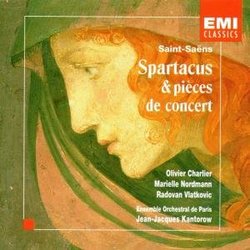| All Artists: Saint-Saens, Kantorow Title: Morceaux De Concert Members Wishing: 0 Total Copies: 0 Label: EMI Classics Imports Release Date: 9/23/1997 Genre: Classical Styles: Forms & Genres, Concertos, Instruments, Brass, Strings Number of Discs: 1 SwapaCD Credits: 1 UPC: 724355558725 |
Search - Saint-Saens, Kantorow :: Morceaux De Concert
 | Saint-Saens, Kantorow Morceaux De Concert Genre: Classical
|
Larger Image |
CD Details |
CD ReviewsIn Saint-Saens' Case, Good Things Come in Small Packages 04/28/2004 (5 out of 5 stars) "Saint-Saens is often criticized for his emotional coolness, the conservatism of his musical idiom, and the, well, trashiness of some of his musical invention (a good case in point is the last movement of the beloved Organ Symphony--full of sound and fury and signifying only a good workout for the orchestra and your stereo system). But the French composer was also capable of creating music that, though by no means great, has an almost Mozartian perfection. The works I think of in this vein are concerted pieces, but not the concertos, all of which have some failing or other that make them far from perfect. No, perhaps the most perfect works Saint-Saens penned are the Introduction and Rondo Capricioso and the Havanaise, both for violin. Though the violin was not Saint-Saens' instrument, he was a virtuoso pianist and knew how to concoct a concerted work that brilliantly showcases the talent of any soloist.So it is with the works on this disc. They're rarely if ever heard in the concert hall, so it's nice to have them on CD, especially in such sympathetic and well-recorded versions as here. All of the works have been recorded before, the Romance for Harp and Orchestra fairly often, though I think it isn't the finest of these compositions. That honor falls to the Morceau de Concert for violin. Really, it's a shame orchestras don't program works like this because it is a very strong sonata-form movement that is as rigorously argued as the best of Saint-Saens' concerto movements--I'm thinking of the first movement of the Third Violin Concerto. Like that movement, the Morceau is cast dramatically in the minor key, but it has an absolutely ravishing second melody in the major that is as important to the musical argument of the piece as the dark and brooding first melody. Olivier Charlier and the orchestra play this powerful little work to the hilt, and they're equally fine in the pretty Caprice Andalou and the tender Romance, a work that's never heard probably because it's rather short compared to the more famous Beethoven and Dvorak romances. Actually, it's not far inferior to the latter work or to Saint-Saens' own Introduction and Rondo Capricioso.The works for harp and horn are given fine performances as well, as fine as I've heard, and probably the best sound they've ever been accorded on disc. But another incentive for buying this collection is the inclusion of "Spartacus," a concert overture that the young Saint-Saens penned for a competition. Despite the subject matter, it is more abstract than Saint-Saens' later tone poems, but it nonetheless captures the dignity and prowess of its eponymous hero. The second melody is a lovely, long-breathed, Lizstian affair with harp accents and swooning strings, while the last part of the score is an apotheosis-march that rounds off the piece in rousing fashion; this section sounds like the contemporary--and very attractive--First Violin Concerto. The recording of "Spartacus," as with the other pieces, is excellent, imparting a good sense of concert-hall realism. Kantorow and his soloists present Saint-Saens in the very best light on this disc, and it can be confidently recommended."
|

 Track Listings (7) - Disc #1
Track Listings (7) - Disc #1